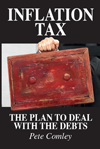Expect inflation to get much worse
Book review: Inflation Tax Pete Comley's book is an interesting read that poses some provocative questions for Britain's policy makers, says Matthew Partridge.

Get the latest financial news, insights and expert analysis from our award-winning MoneyWeek team, to help you understand what really matters when it comes to your finances.
You are now subscribed
Your newsletter sign-up was successful
Want to add more newsletters?

Twice daily
MoneyWeek
Get the latest financial news, insights and expert analysis from our award-winning MoneyWeek team, to help you understand what really matters when it comes to your finances.

Four times a week
Look After My Bills
Sign up to our free money-saving newsletter, filled with the latest news and expert advice to help you find the best tips and deals for managing your bills. Start saving today!

One feature of the current slump has been that inflation has held up, even while the economy has stagnated. The Bank of England has missed its inflation target nearly continuously for the past four years.
In his book, Pete Comley argues that investors should expect this state of affairs to continue and even worsen, as rising prices are a key part of the government's strategy to keep the deficit under control. Worse, current figures may underestimate the extent to which inflation has eroded savings and pay packets, with headline rates artificially kept down by a series of statistical distortions.
MoneyWeek
Subscribe to MoneyWeek today and get your first six magazine issues absolutely FREE

Sign up to Money Morning
Don't miss the latest investment and personal finances news, market analysis, plus money-saving tips with our free twice-daily newsletter
Don't miss the latest investment and personal finances news, market analysis, plus money-saving tips with our free twice-daily newsletter
The book is divided into four sections. In the opening, Comley defines what inflation is and examines the debates between Keynesians and monetarists (the main economic schools involved) over its cause. The book then changes tack, looking at how debt levels have evolved since World War II. The author combines these elements to argue that inflation functions as a de facto tax on savers and wage earners. In the final three chapters he gives his thoughts as to the path that prices may take in the future, along with some investment ideas.
Its main argument about the inevitability of prolonged financial repression' (ie, interest rates below the rate of inflation) is one we wholeheartedly agree with. We're also impressed that Comley looks back as far as the Victorians' experience in his history of British fiscal management. He also has a knack for making points that others have overlooked.
For instance, he notes that changes in the way that inflation is calculated have had a major knock-on effect on the way that economic growth is measured. He works out that if the deflator a measure of inflation used to adjust GDP figures had closely followed the retail prices index, as it did until 2007, the figures would have shown a brief recovery in 2009, followed by an ongoing double-dip recession. Given this is what many economists expected to happen, it raises the question of whether a lot of the recent good news' is down to statistical sleight of hand.
As with many self-published books, the presentation is awkward at times, with narrow margins, and could benefit from a polish. Comley's dismissal of the monetarist view of inflation is premature, especially since if you look at data since the 1960s, the relationship between broad money and inflation is relatively strong. But overall this is an interesting book that asks some provocative questions and deserves to be republished by a mainstream publisher.
Inflation Tax: The Plan To Deal With The Debts is available online for £9.99. You can read the first chapter free at Inflationtaxbook.com.
Get the latest financial news, insights and expert analysis from our award-winning MoneyWeek team, to help you understand what really matters when it comes to your finances.

-
 MoneyWeek Talks: The funds to choose in 2026
MoneyWeek Talks: The funds to choose in 2026Podcast Fidelity's Tom Stevenson reveals his top three funds for 2026 for your ISA or self-invested personal pension
-
 Three companies with deep economic moats to buy now
Three companies with deep economic moats to buy nowOpinion An economic moat can underpin a company's future returns. Here, Imran Sattar, portfolio manager at Edinburgh Investment Trust, selects three stocks to buy now
